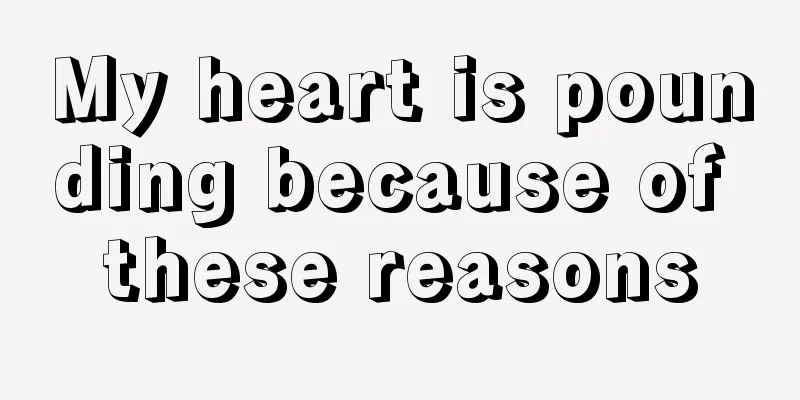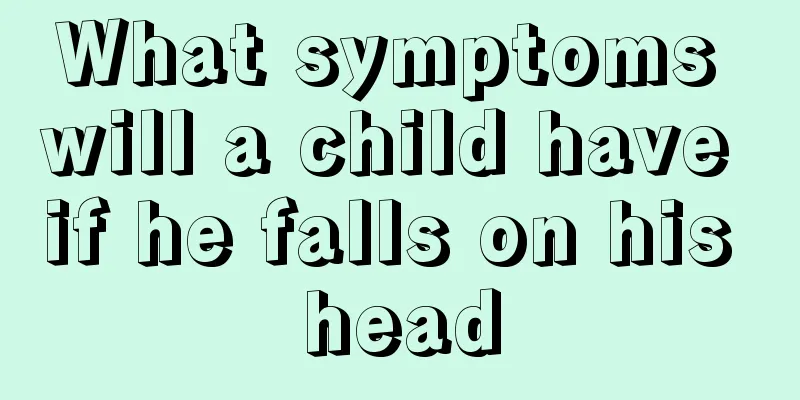My heart is pounding because of these reasons

|
Some friends cannot control themselves when encountering some unexpected events, and their hearts start to pound. In addition, it may also be caused by physiological, drug-related and pathological reasons. If it cannot be effectively controlled in time, you should go to the hospital for examination and treatment in time. 1. What causes a rapid heartbeat? 1. Physiological reasons Physiologically fast heart rate is very common. Many factors can affect the heart rate, such as changes in body position, physical activity, food digestion, emotional anxiety, pregnancy, excitement, fear, excitement, drinking, smoking, drinking tea, etc., all of which can increase the heart rate. Age is also a factor; children tend to have faster heart rates. 2. Drug-related causes Such as sympathomimetic drugs such as ephedrine and adrenaline. Parasympathetic blocking drugs such as atropine, caffeine, thyroxine, amphetamine, etc. can cause a rapid heart rate. 3. Pathological causes Such as systemic diseases: high fever, anemia, hypoxia, infection, hyperthyroidism, pain, acute rheumatic fever, beriberi and neurosis can cause a rapid heart rate. 2. What should I do if my heart beats too fast? 1. Breath holding method Ask the patient to take a deep breath, hold it, and then exhale forcefully. Another method is to ask the patient to take a deep breath, hold his breath, and then inhale forcefully. Using these two methods can sometimes slow down a rapid heartbeat. 2. Induce vomiting Stimulating the throat with a tongue depressor or fingers can induce vomiting, which can reflexively cause the heart rate to slow down by stimulating the vagus nerve. 3. Carotid sinus compression Find the part of the neck where the pulse is most obvious, approximately at the same level as the upper edge of the thyroid cartilage, and use the 2nd, 3rd, and 4th fingers to press the cervical vertebrae. It is best to focus on massage, with each time not exceeding 5 to 10 seconds. If there is no effect, massage again after a few seconds, but do not press on both sides at the same time as there is a risk of sudden heart arrest. If you notice your heartbeat slowing down, stop compressions immediately. 4. Pressure on the eyeball Have a family member press one or both eyeballs with their fingers for about 10 seconds, wait until the heartbeat stops temporarily, and then slowly reduce the pressure. Do not apply too much pressure on the eyeball. People with glaucoma or high myopia cannot use this method because there is a risk of increased intraocular pressure or retinal detachment. |
<<: What to do if you get angry in winter, what to eat
>>: What can people with diabetes eat? Have you eaten all of these?
Recommend
What Chinese medicine is good for kidney deficiency and liver fire?
A body with kidney deficiency will actually make ...
What to do if your throat is itchy
How to effectively solve the problem of itchy thr...
Can mid- to late-stage ovarian cancer be cured?
Can mid-to-late stage ovarian cancer be cured? Ad...
Causes and symptoms of keratoconus after myopia surgery
Any surgery has side effects, and myopia surgery ...
How to diagnose lung cancer? Differential diagnosis of lung cancer
Lung cancer is a common disease that is difficult...
What department should I go to if I am thin
For the body, a stable state is a healthy state. ...
Can butter be used to fry eggs?
I believe many people have eaten butter, and it i...
What will happen if liver cancer is not treated in time? Liver cancer will bring these harms to the body
As we all know, early liver cancer is not easy to...
What to do for acute enteritis? These methods tell you
Acute enteritis is a common digestive system dise...
What are the correct ways to deodorize the refrigerator
Nowadays, many people only focus on their daily w...
Are cream and butter the same?
Cream is a common thing in people's daily lif...
What are the side effects of taking venlafaxine hydrochloride extended-release tablets for depression
Nowadays, most people are under pressure from all...
What foods are incompatible with chestnuts
Chestnuts are a type of nut that people like to e...
How much does mediastinal teratoma surgery cost?
Generally speaking, teratoma is also a type of tu...
Taking good brain cancer treatment methods can help you fight the disease to the end
Brain cancer is a very troublesome disease. Patie...









